Skip to comments.
Attack On Europe: Documenting Russian Equipment Losses During The 2022 Russian Invasion Of Ukraine (2 year anniversary)
ORYX ^
| Since February 24, 2022 and daily
| ORYX
Posted on 02/24/2024 5:59:01 AM PST by SpeedyInTexas
click here to read article
Navigation: use the links below to view more comments.
first previous 1-20 ... 21,241-21,260, 21,261-21,280, 21,281-21,300, 21,301-21,313 last
To: blitz128

🍈
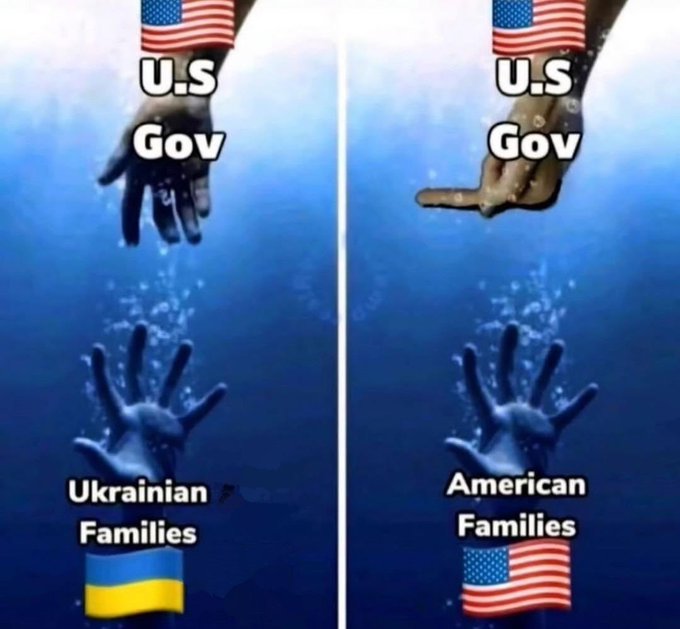
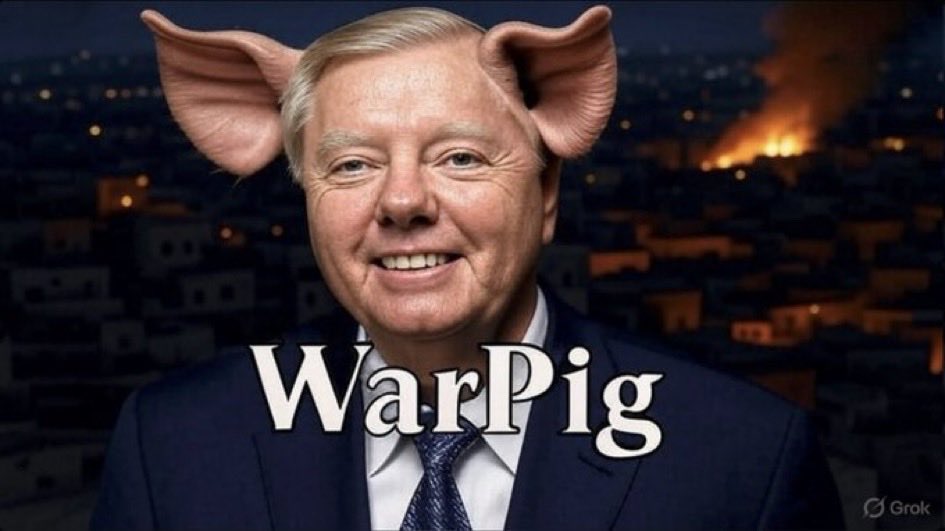 VOLKSWAGEN’S €11 BILLION PROBLEM - GERMANY’S ENGINE IS STALLING
VOLKSWAGEN’S €11 BILLION PROBLEM - GERMANY’S ENGINE IS STALLING
Volkswagen’s missing €11 billion.
That’s the cash shortfall threatening to grind the automaker’s operations to a halt beyond 2025.
Sales are collapsing in China, U.S. tariffs are biting, and Europe’s EV boom has turned into a slow crawl.
Add Germany’s soaring energy and labor costs, and the math starts to look fatal.
VW’s answer? Brutal cost cuts, asset sales, and a leadership shake-up that insiders say could define the company’s survival.
Analysts warn of credit downgrades, layoffs, and a blow to Germany’s industrial identity.
If Volkswagen sputters, it’s not just a car crisis - it’s a warning light for Europe’s entire economy.
Source: Reuters, Bloomberg
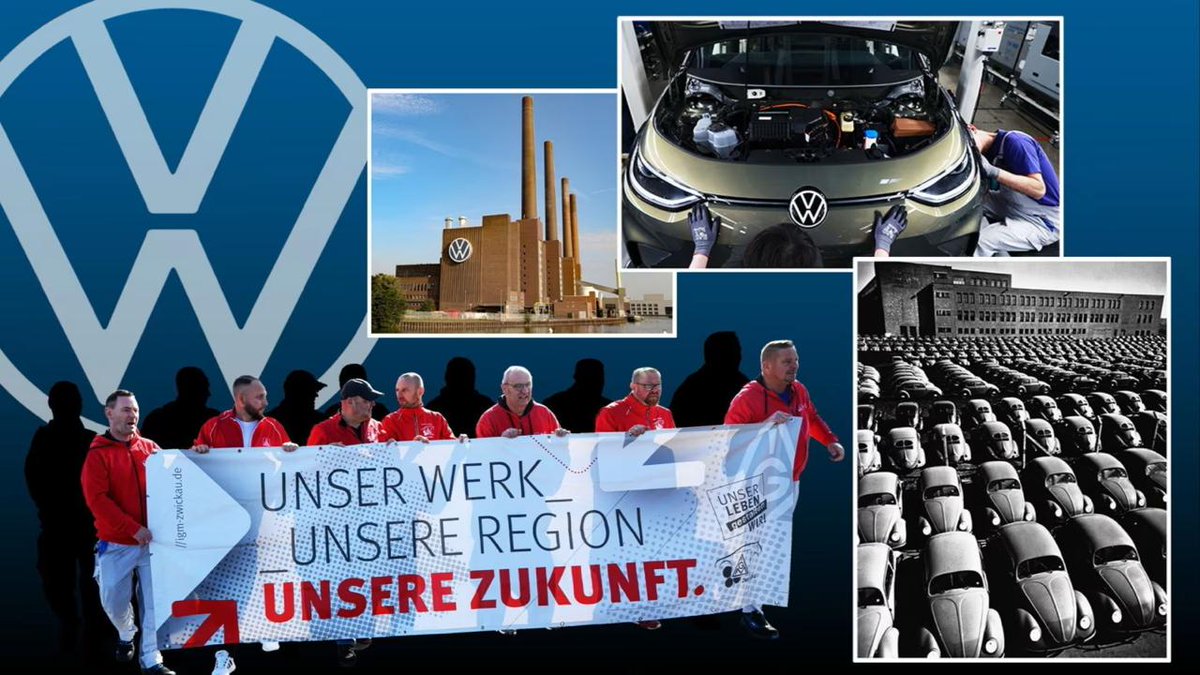 ********
******** 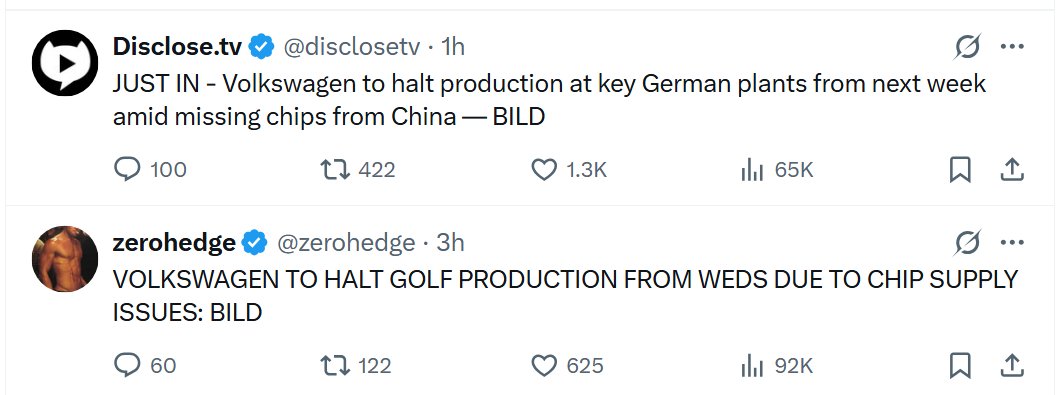
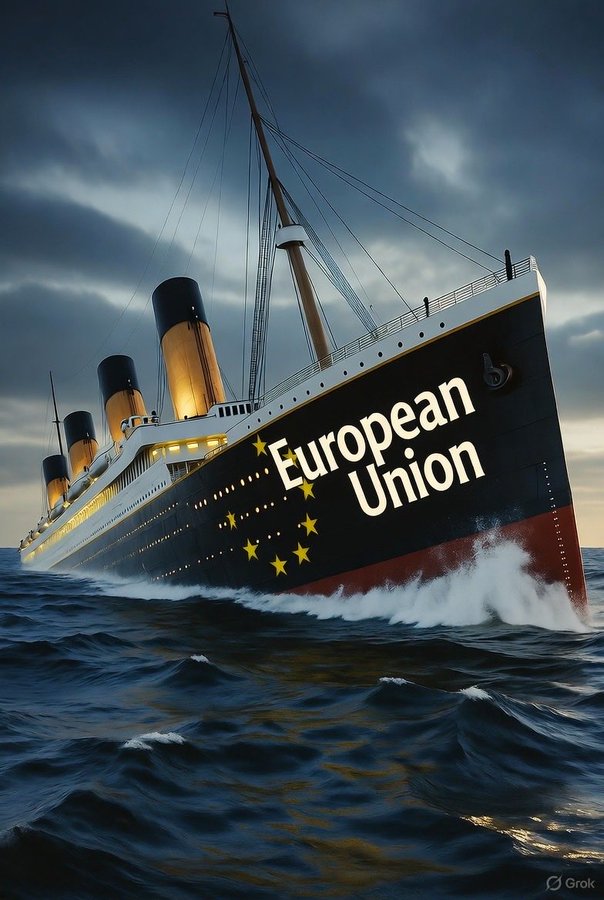
Behold the "Green" future they promised: powerful German industry completely enslaved to Chinese supply chains. Our globalist elites systematically hollowed out the West, trading our industrial sovereignty for cheap parts from a geopolitical rival. They wanted us dependent. Now, the masters in Beijing are simply tightening the leash. 23 October 1941. Field Marshal Georgy Zhukov took command of the Red Army’s operations. His 1st task was to prevent the German army capturing Moscow which he achieved in December 1941. He was then a key figure in the total victory of the Red Army on the Eastern Front.
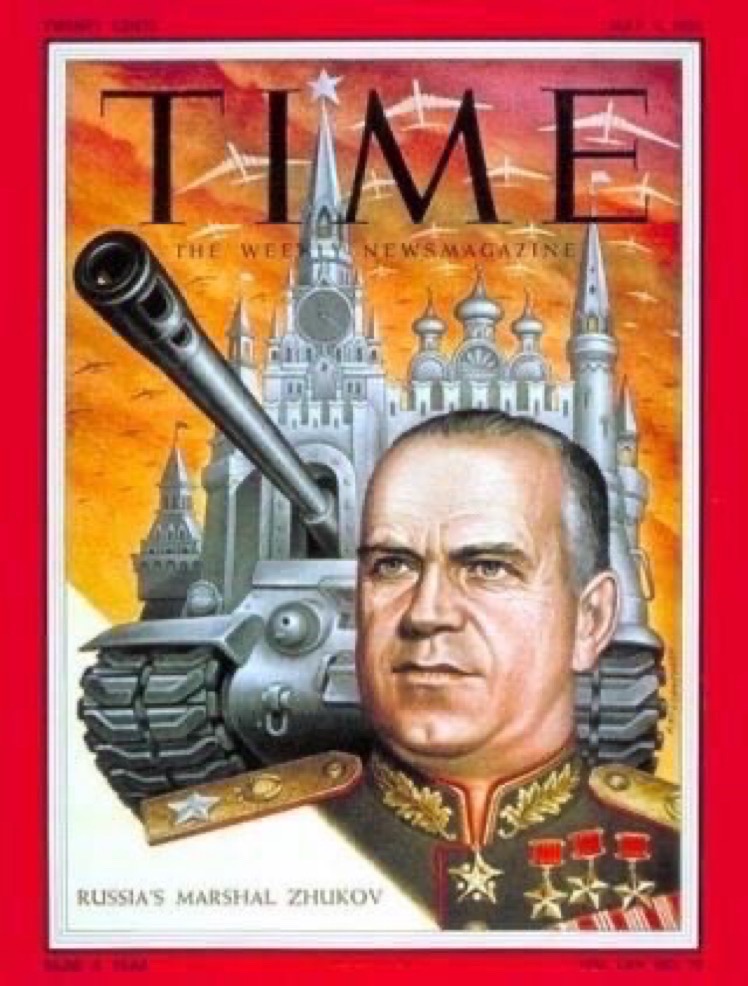
GERMANY IN FREEFALL - INDUSTRY BLEEDS, JOBS VANISH, RESTAURANTS DIE
The so-called “engine of Europe” is coughing up smoke. Germany’s economy isn’t just slowing - it’s unraveling.
The hospitality sector, once the soft cushion of the Mittelstand, just posted catastrophic summer numbers: real turnover down 3.5% in August, even in peak holiday season.
The party’s over - restaurants, hotels, caterers all sinking in unison.
Behind the scenes, the industrial heart that powered postwar Germany has lost a quarter of its output since 2018.
Factories closing, firms fleeing, 270,000 manufacturing jobs gone in just over a year. The private sector shrinks; the bureaucracy swells by 50,000 new state jobs.
1.3 million private-sector jobs erased. Insolvencies up 27% in hospitality alone. The country’s on track for 25,000 corporate collapses this year - €60 billion in economic wreckage.
Berlin’s fix? Cut restaurant VAT back to 7%. A symbolic band-aid on a corpse.
Germany’s problem isn’t inflation - it’s exhaustion. Too many taxes, too much red tape, too little faith.
The beer’s still cold, but the optimism’s gone flat.
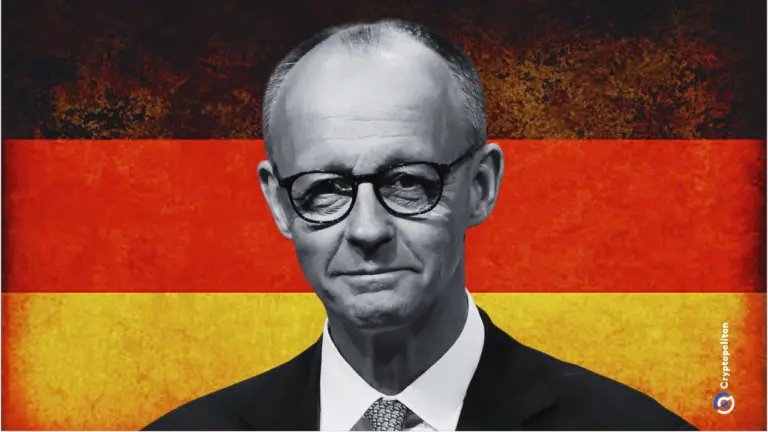
NEW - Germany's Foreign Minister Wadephul (CDU) cancels trip to China as "nobody wants to meet him."

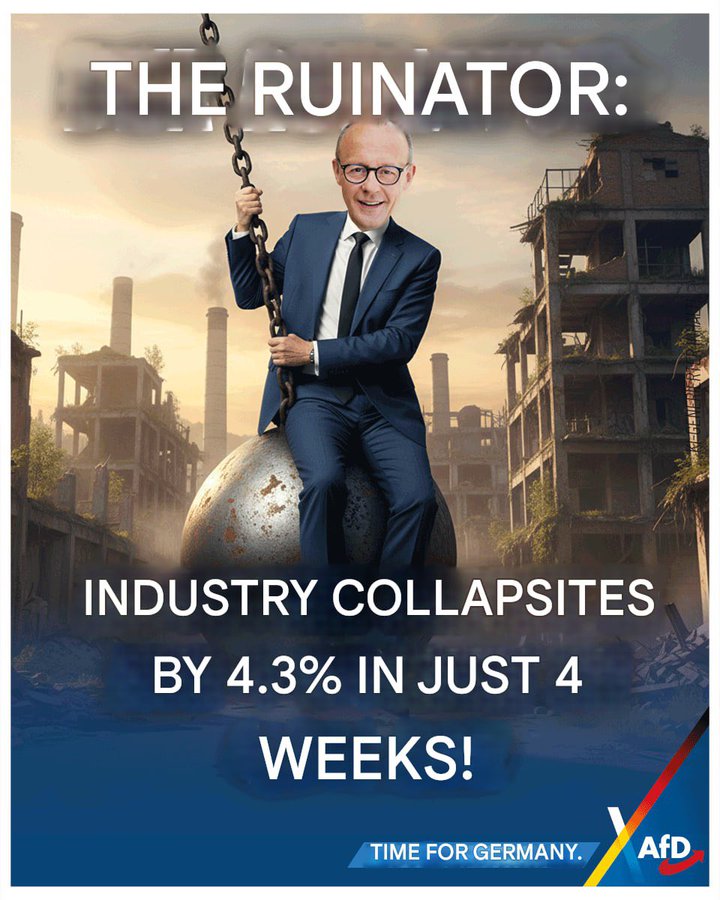
🍈

To: AdmSmith
Russia becoming vassal state to Kim as well. Poor Russia, fallen so low.
21,302
posted on
10/30/2025 5:41:19 AM PDT
by
PIF
(They came for me and mine ... now its your turn)
To: PIF
2022- Russia is self sufficient, large wealth fund, budget surplus, Europe will freeze
2025-Russia importing arms, ammunition, and equipment, food, fuel, cars, trucks, manpower, huge budget deficits, massive tax increases, GDP collapse, Russian legacy military equipment depleted, much of Black Sea fleet turned to submarines and the rest hiding, energy sector hemorrhaging money, fuel lines, but
Religious idol production way up
To: Wrong
🍈
2022- Ukraine is a strong, Biden-friendly, self-sufficient European nation with a young Churchill for president and plenty of US tax dollars to go around.
2025-Ukraine is importing arms, ammunition, and equipment, food, fuel, cars, trucks, manpower from NATO nations causing economic turmoil in the EU, especially Germany where there are huge budget deficits, massive tax increases, GDP collapse.
Zeepers on the Ghetto Thread remain a delusional laughingstock.
To: blitz128
Once again the usuals don’t address the point.
Yes Ukraine is getting lots of help, the difference is that everything the usuals said about Russia being self sufficient, GDP…and their historical posts show that narrative are all false now.
And it is President Trump that is supporting Ukraine, enjoy.
To: blitz128
Another oil refinery in Russia has closed. The Ilsky Oil Refinery announced the temporary shutdown of some production capacity.
Industry sources note that the refinery is also experiencing problems with product sales and is reducing refining volumes.

https://x.com/Maks_NAFO_FELLA/status/1983834335213187117
21,306
posted on
10/30/2025 8:50:54 AM PDT
by
AdmSmith
(GCTGATATGTCTATGATTACTCAT)
To: AdmSmith
“the refinery is also experiencing problems with product sales”
The rest of the petrochemical supply chain, downstream from the refineries (like chemical or ammunition plants) is being targeted as well by drone strikes, or failing due to other economic pressures, further backing up the flow.
To: BeauBo
Moscow. October 30. INTERFAX.RU - Sales of Russian agricultural machinery in the domestic market in January-September 2025 decreased by 26.5%, to 114.3 billion rubles, according to the Russian Association of Manufacturers of Specialized Machinery and Equipment (Rosspetsmash).
The rate of decline in the market continued to slow down in the third quarter. As reported, the volume of shipments of Russian agricultural machinery in the first quarter amounted to 38.3 billion rubles (-32.9% in annual terms), in the first half of the year - 75.6 billion rubles (-32.1%).
A decrease in shipments for 9 months of 2025 was recorded, in particular, for the main types of agricultural machinery. Deliveries of combine harvesters fell by 42.1% (to 1.57 thousand units), agricultural tractors - by 36.5% (to 1971 tractors), self-propelled forage harvesters - by 17.6% (to 150 units).
As noted in Rosspetsmash, the factors of pressure on the market remain the high key rate, low profitability of the agricultural business and insufficient financing of the “1432 program”, through which discounts on agricultural machinery in the amount of 10-50% are subsidized for its sale to farmers on preferential terms.
https://www.interfax.ru/business/1055511
If agriculture were to produce at a steady level over the years, sales of agricultural machinery should be roughly constant. Now they are down 35% on an annual basis. (And how was it last year?) This means that agricultural production is facing a decline next year (as well).
21,308
posted on
10/30/2025 9:22:22 AM PDT
by
AdmSmith
(GCTGATATGTCTATGATTACTCAT)
To: moron
🍈
And it is President Trump that is supporting Ukraine
It appears the negotiation tactic of "good cop, bad cop" and/or "saber rattling" are concepts lost on Zeepers.
They are, and remain, very Low IQ'ers
To: AdmSmith; misha; Nikita
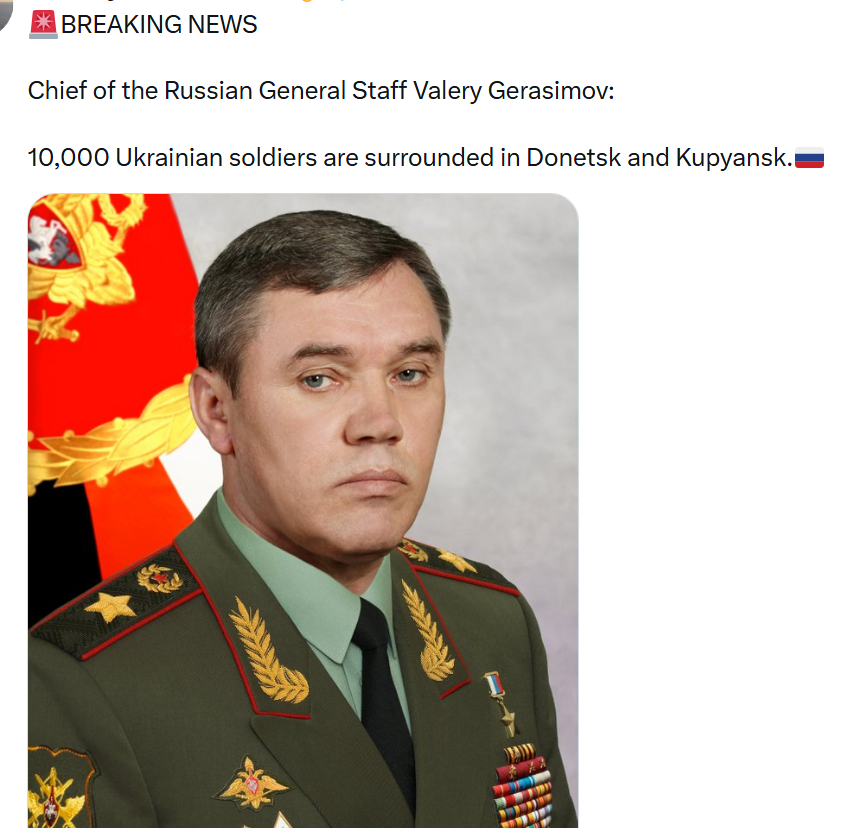
BDA and analysis on the recent strike on Rosneft’s big Ryazan refinery, near Moscow.
OilPrice.com (24 Oct):
“Russia’s Ryazan oil refinery—its fourth-largest and a key Rosneft asset southeast of Moscow—was forced to halt a major crude distillation unit after a Ukrainian drone attack set part of the facility ablaze this week, industry sources told Reuters.
The targeted unit, CDU-4, handles roughly 4 million metric tons of crude per year, or about 80,000 bpd—nearly a quarter of the refinery’s total capacity. The stoppage, combined with secondary unit shutdowns including a reformer, vacuum gasoil hydrotreater, and catalytic cracker, has sharply reduced output. Rosneft has not commented, but sources say the plant continues limited operations.
Ukraine said it hit the Ryazan refinery, one of a growing number of strikes on Russian fuel sites as U.S.-led peace efforts drag on. Kyiv’s drones have been taking aim at the infrastructure feeding Russia’s war machine, and the Kremlin has been pointing to those same attacks to explain gasoline and diesel shortages at home.
Ryazan processed 13.1 million tons of crude last year, yielding 2.3 million tons of gasoline, 3.4 million tons of diesel, and 4.2 million tons of fuel oil. A prolonged outage could pressure domestic fuel availability further just as Russia heads into winter, when heating demand peaks and logistical networks tighten.
For global markets, the direct supply hit is small, but the symbolism isn’t. Every successful strike deep inside Russia adds to the risk premium baked into oil prices and tests the Kremlin’s ability to protect the infrastructure that underpins its export revenues.”
“Putin said. “But they will not significantly affect our economic well-being.””
President Trump’s Bone-Crushing new sanctions are making many diverse and serious impacts - despite Russian assertations to the contrary. (Pro Tip: Putin lies)
Sanctions Halt Oil Flows to Serbia as Russian-Owned NIS Faces Refinery Shutdown
OilPrice.com (24 Oct):
“Russia-owned Naftna Industrija Srbije (NIS) has halted crude processing as U.S. sanctions choke oil flows to Serbia, triggering fears of a fuel shortage ahead of winter. A shipment of roughly one million barrels of Kazakh KEBCO crude that arrived at Croatia’s Omisalj terminal on 9 October remains blocked after deliveries through the JANAF pipeline were suspended on 8 October, according to multiple industry sources cited by Reuters on Friday.
The U.S. Treasury’s Office of Foreign Assets Control (OFAC) allowed a sanctions waiver on NIS to expire on 9 October, formally cutting the company off from international crude purchases. NIS, 56 percent owned by Gazprom Neft, runs Serbia’s only refinery at Pancevo, which processes about 4.8 million tonnes of crude per year and supplies over 80 percent of the country’s gasoline and diesel demand. Without new cargoes, refining operations could stop by early November, officials and traders said.
Serbia’s government has downplayed the immediate risk. President Aleksandar Vucic said current inventories are sufficient through the end of the year, but analysts warned that prolonged disruption would force the country to depend on product imports through neighboring EU states.
The JANAF pipeline from Croatia had been Serbia’s primary supply line for Russian and Kazakh crude since 2022. Its closure underscores the limited flexibility of Balkan energy logistics, where few alternative routes exist and domestic storage capacity remains constrained.
Earlier this month, regional analysts said the U.S. measures were likely to hit Serbia’s downstream sector hard, calling NIS’s exposure “a critical vulnerability” for the Balkan state.
Serbia is now seeking replacement cargoes via Hungary and exploring temporary swaps through regional refiners. Whether those can arrive fast enough to keep Pancevo running will determine if Serbia avoids a full-blown fuel crunch.”
France announces more Mirage fighter jets, Tomahawk negotiations still ongoing, Starmer says
Kyiv Independent (24 Oct):
“French President Emmanuel Macron on Oct. 24 announced that his country would provide Ukraine with “additional Aster missiles, new training programs, and new Mirage” fighter jets in the coming days, without providing further details.
The Aster is a surface-to-air missile used in the SAMP/T air defenses. France has previously supplied Ukraine with the air defense system, as well as several Mirage 2000 fighter jets.
“We need to continue to step up our military support to Ukraine — air defense capacities, long-range capabilities, drones, and anti-drone systems,” Macron said.
France and the U.K. have previously provided Ukraine with SCALP/Storm Shadow missiles, most recently used to strike a Russian chemical plant in Bryansk on Oct. 21.
The announcement came as President Volodymyr Zelensky and European leaders met in London on Oct. 24 for a summit of the “Coalition of the Willing,” a European-led initiative launched by the U.K. and France...
...U.K. Prime Minster Kier Starmer said that negotiations over Tomahawks were still ongoing.
“We are still working on it,” he said.”
To: AdmSmith
the volume of shipments of Russian agricultural machinery... in the first half of the year (2025) - 75.6 billion rubles (-32.1%).
32% drops are not just “down turns”, they are crashes, that are likely to bankrupt some of the companies involved.
Many other Russian industries are experiencing similar crashes this year - even those like metal fabricators, who had been beneficiaries of Russia’s surge in Government spending to support their wartime economy.
It seems that the Russian Government has expended its policy options to prop up the economy and living standards. The bills are coming due.
To: BeauBo
But there is a bright side to the closings and bankruptcies - more unemployed, which means more troops for the meat grinder.
Putin polishing off what remains of his skilled workforce. Its for their own good because they will now be protected from the evils of Nazism and other root causes.
21,312
posted on
10/30/2025 1:03:54 PM PDT
by
PIF
(They came for me and mine ... now its your turn)
To: PIF
“more unemployed, which means more troops for the meat grinder.”
Because of Putin.
Every Winter gets harder for Russians, as long as Putin’s war goes on.
Navigation: use the links below to view more comments.
first previous 1-20 ... 21,241-21,260, 21,261-21,280, 21,281-21,300, 21,301-21,313 last
Disclaimer:
Opinions posted on Free Republic are those of the individual
posters and do not necessarily represent the opinion of Free Republic or its
management. All materials posted herein are protected by copyright law and the
exemption for fair use of copyrighted works.
FreeRepublic.com is powered by software copyright 2000-2008 John Robinson












